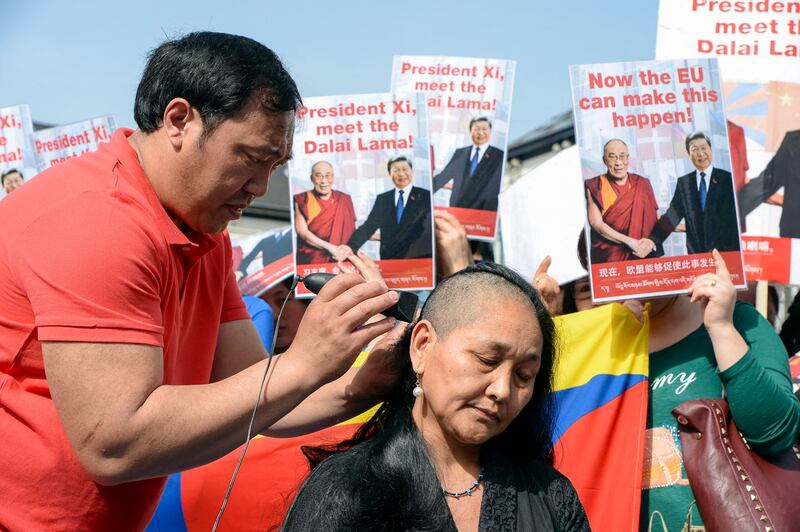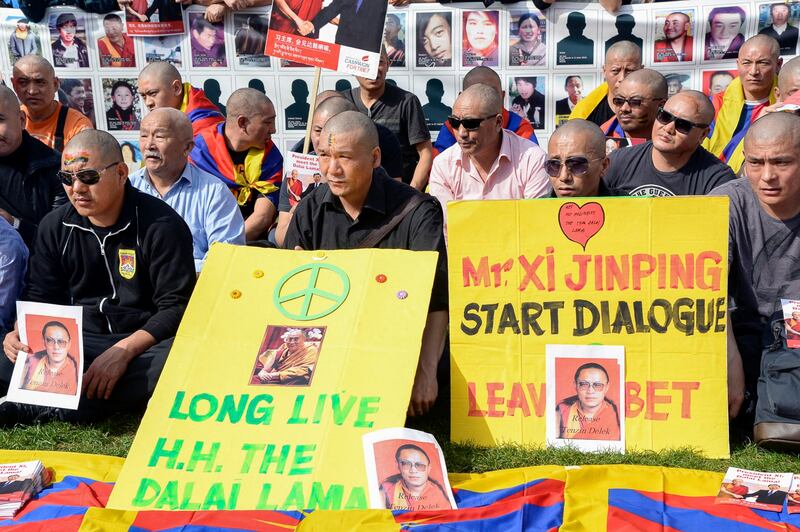European Union officials are scheduled to make a rare visit starting this weekend to the Tibet Autonomous Region during their annual human rights talks with China, an EU spokesperson told Radio Free Asia.
Although it isn’t clear how much access the officials will ultimately be granted, the spokesperson, Peter Stano, told RFA that the EU has put forth “concrete proposals” for the places the delegation would like to see, including boarding schools, prisons and places of worship.
“We have requested a meaningful, non-touristic visit that will allow us to measure our long-standing human rights concerns against the reality in Tibet on the ground,” Stano said.
A small group of EU officials led by Paola Pampaloni, the EU’s deputy managing director of Asia and Pacific Department, will make the visit to Tibet during the annual EU-China Human Rights Dialogue in Chongqing, China, that is scheduled to start on June 16.

The Tibet visit was agreed in principle during a previous round of EU-China talks, the EU spokesperson told RFA. The details of the visit are being organized by Chinese authorities and remain unclear.
“It’s very rare that an official visit such as this one is taking place,” Vincent Metten, EU policy director for the International Campaign for Tibet, told RFA from Brussels. The last highest EU official visit to Tibet was more than 10 years ago when then-EU Special Representative for Human Rights Stavros Lambrinidis took a trip there in September 2013.
RELATED STORIES
[ Returning Tibetans see a changing homelandOpens in new window ]
[ UN human rights chief issues damning report on Chinese abuses in XinjiangOpens in new window ]
[ EU Parliament calls on China to abolish Tibetan boarding schoolsOpens in new window ]
Access to Tibet remains difficult, if not impossible, for diplomats, parliamentarians, non-governmental organizations, journalists and even tourists.
A U.S. State Department report on access to Tibetan areas said Chinese security forces have used "conspicuous surveillance" to intimidate, monitor, harass and restrict the movements of U.S. diplomats, officials and tourists traveling to Tibetan areas.
Tenzin Lekshay, a spokesman for the Central Tibetan Administration – the Tibetan government-in-exile based in Dharamsala, India – said it would be crucial for EU officials to have the ability to travel freely inside Tibet for the trip to yield meaningful results.
“It would be difficult to understand the realities of human rights conditions inside Tibet if their movement is restricted by the Chinese,” Lekshay said.
Talk is cheap
News of the pending trip to Tibet comes after five human rights groups criticized the EU’s continued participation in the broader human rights dialogue with China, noting little has changed in 38 previous rounds of talks.
In a June 12 statement, Amnesty International, Human Rights Watch, Front Line Defenders, International Service for Human Rights and the World Uyghur Congress said that the talks allow European officials to raise key issues with their Chinese counterparts.

But the lack of measurable benchmarks or defined objectives make the discussions a largely pointless exercise, the letter states.
“While the EU raises concerns during these dialogues, it knows that the Chinese government will not acknowledge abuses, will not undertake any effort to secure accountability, and will not be persuaded to undertake any policy or legislative action to comply with China’s international human rights obligations,” the groups said.
Sophie Richardson, a visiting scholar at Stanford University’s Center on Democracy, Development and Rule of Law, said in an interview with RFA Uyghur that these types of talks can do more harm than good in that they tend to relieve the pressure on more senior political leaders to press the case for change with their Chinese counterparts.
“Beijing’s goal in these dialogues is to keep human rights out of all other conversations,” said Richardson, who previously was China director for Human Rights Watch.
“This diplomatic tool not only stopped being useful about a decade ago, but actually started to be problematic because it prevents you from doing things that I think would be more effective, like pursuing investigations of the Chinese government officials who are complicit in crimes against humanity,” she said.

She added that the Tibetan trip’s value won’t be known until a clearer understanding of the restrictions the delegation will operate in is known.
The EU has been critical of Chinese policies in Tibet and in the Xinjiang Autonomous Region, where more than 1 million Uyghurs and other ethnic Turkic Muslims have been detained in a crackdown that began in 2017.
Tibetan boarding schools
In December, Janez Lenarčič, EU crisis management commissioner, gave a speech criticizing China's restrictive policies in Tibet and in Chinese provinces where many Tibetans live.
She noted political repression and widespread reports of Tibetan students being pressured to attend boarding schools with Mandarin-heavy curriculums, which critics say threatens Tibetan cultural and religious traditions.
Chinese officials say that boarding schools are the best way to educate a population of students scattered in remote areas over a vast geographical region. The students aren’t forced to attend the schools, according to official statements.

But exiled Tibetans say Chinese authorities coerce attendance by promising to withhold governmental benefits or future educational opportunities.
Previous international delegations that have visited areas where many of the abuse claims emanate have been limited.
A 2022 United Nations report based on a trip to Xinjiang alleged serious human rights abuses had been perpetrated against ethnic Uyghurs and others there in the name of combating terrorism and extremism.
China said the report was based on “disinformation and lies fabricated by anti-China forces.”
Tenzin Dawa, director of the Tibetan Center for Human Rights and Democracy in Dharamsala, India, said the visiting EU officials should try to find information on Tibetan political prisoners Go Sherab Gyatso and Lodoe Gyatso.
Go Sherab Gyatso is a writer and educator known for his loyalty to the exiled spiritual leader the Dalai Lama.
Lodoe Gyatso was rearrested and sentenced to 18 years for protesting against repression in Tibet shortly after he had been released from a 20-year sentence.
Additional reporting by Tenzin Dhonyoe, Dickey Kundol and Dechen Wangmo. Translated by Tenzin Dickyi, and edited by Jim Snyder and Malcolm Foster.

